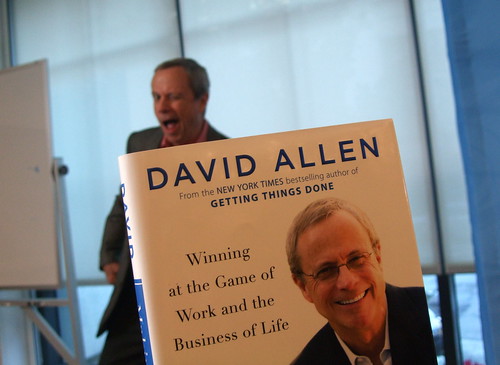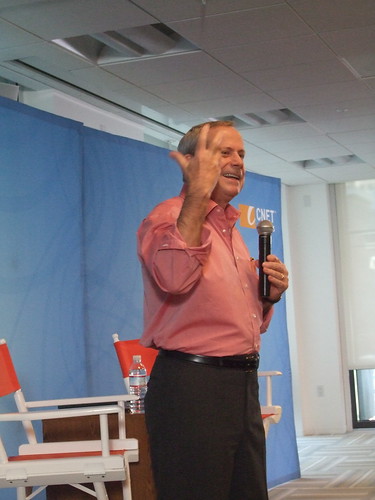David Allen explains how to Make It All Work

David Allen, author of Getting Things Done and Ready For Anything, energized the employees at CBS Interactive today at a BNET Speaker Series. His new book, Making It All Work, was the topic of today's conversation.
If you don't lose control throughout the day or fall off the wagon regularly, you're getting stale.
I am the laziest guy you've ever met. I can't help thinking from the time I wake up till the time I goto bed, "How much easier can I do this?".
I've spent thousands of hours testing stuff out that doesn't work. People pay me big bucks to have me show them how stuff doesn't work.
This is as simple as you can get, if you make it simpler, it will blow up. If you tried to make it all too simple, it won't map to the reality and complexity of the world.
This is the stuff you already know how to do. You have every single tool you'll ever need to do this. But what's "this"?
It's very possible to be buried with tons of stuff to do, changing fast, and still have nothing on your mind.
The end result of what I'm teaching you today is this: whatever you're doing, you are capable of being totally lost in it; and not worrying about it.
Once people begin to implement these things, work lightens up a ton, and life becomes more clear.
Work is "anything you wanna get done that ain't done yet". There is an inverse relationship between things that are on your mind and getting things done. You need to get things off your mind and on to cruise control. The end game is a clear head. And the best way to be is to do.
Everything you read in this book, you could have learned and figured out when you were 12 years old.
Whenever people externalize their committments, they absolutely get them off their mind. Calendars and lists help us because they get things off our minds and onto paper.
Control and perspective are closely related. Simply organizing won't help you get in control though.
The biggest, leakiest place to file information is in your head.
But most people's existential experience with their planners is incomplete because you have to keep worrying about them and planning to think about items on there. Just relax.
Five stages of control
Capture the things that are pulling you out of control. Write them down. Get them from your brain to paper.
Clarify them. What exactly do I mean? Go into details with your plan. Sit down and be an executive on the front end.
Worst thing to do: wait until the last minute to make a decision. Don't let the heat from others burn you.
Organize your content. Categorize, decide, review. Look at your inventory of committments.
You can only feel good about what you're not doing, when you know what you're not doing. Don't avoid the anxiety of non-decision making.
Reflect on what you are doing. Double-check it. Are you in the driver's seat?
Engage resources. This is the action level. Do things.
Two types of projects:
- Projects I want to finish as soon as I can.
- Projects I want to do sometime maybe.
Engaging regularly with life, will naturally make you lose control and focus.
Your action list should be very discrete, and separated from your project list.

